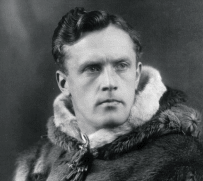Related Research Articles

Helge Marcus Ingstad was a Norwegian explorer. In 1960, after mapping some Norse settlements, Ingstad and his wife archaeologist Anne Stine Ingstad found remnants of a Viking settlement in L'Anse aux Meadows in the province of Newfoundland in Canada. They were thus the first to prove conclusively that the Icelandic/Greenlandic Norsemen such as Leif Erickson had found a way across the Atlantic Ocean to North America, roughly 500 years before Christopher Columbus and John Cabot. He also thought that the mysterious disappearance of the Greenland Norse Settlements in the 14th and 15th centuries could be explained by their emigration to North America.

Berge Ragnar Furre was a Norwegian historian, theologian and politician for the Socialist Left Party.

Arktikugol is a Russian coal mining unitary enterprise which operates on the island of Spitsbergen in Svalbard, Norway. Owned by the government of Russia, Arktikugol currently performs limited mining in Barentsburg. It has carried out mining operations in the towns of Pyramiden and Grumant, which it still owns, and once operated a port at Colesbukta. The company is headquartered in Moscow and is the official agency through which Russia, and previously the Soviet Union, exercised its Svalbard policy.
Knut Helle was a Norwegian historian. A professor at the University of Bergen from 1973 to 2000, he specialized in the late medieval history of Norway. He has contributed to several large works.

Tore Pryser is a Norwegian historian, who has served as professor at the Lillehammer University College since 1993.

Adolf Hoel was a Norwegian geologist, environmentalist and Polar region researcher. He led several scientific expeditions to Svalbard and Greenland. Hoel has been described as one of the most iconic and influential figures in Norwegian polar exploration in the first half of the 20th century, alongside Fridtjof Nansen and Roald Amundsen. His focus on and research of the polar areas has been largely credited as the reason Norway has sovereignty over Svalbard and Queen Maud Land in the Antarctica. Hoel was the founding director of the Norwegian Polar Institute and served as rector of the University of Oslo and as President of the Norwegian Society for the Conservation of Nature.
Kari Nyquist was a Norwegian ceramist. She is most associated with her decorated ceramics from the Stavangerflint AS plant in Stavanger, Norway. Her designs are most often found pottery of blue clay or stoneware.

Hans Fredrik Dahl is a Norwegian historian, journalist and media scholar, best known in the English-speaking world for his biography of Vidkun Quisling, a Nazi collaborationist and Minister President for Norway during the Second World War. His research is focused on media history, the totalitarian ideologies of the 20th century, and the Second World War. He served as culture editor of Dagbladet 1978–1985 and has been a board member of the paper since 1996. He was a professor at the University of Oslo 1988–2009, and is now a professor emeritus.
Henrik Grue Bastiansen is a Norwegian historian who specializes in media studies.
Gunnar Christie Wasberg was a Norwegian historian, philosopher and first librarian at the University of Oslo Library.
Torill Thorstad Hauger was a Norwegian novelist, children's writer, non-fiction writer and illustrator. She was the author of a number of prize-winning novels with historical themes for children and teenagers.
Wera Sæther is a Norwegian psychologist, poet, novelist, essayist, writer of books for youth and of documentary books. She made her literary debut in 1974 with the poetry collection Barnet og brødet. Sæther was awarded the Gyldendal's Endowment in 1979. She was awarded the Dobloug Prize in 1996.

The economy of Svalbard is dominated by coal mining, tourism and research. In 2007, there were 484 people working in the mining sector, 211 people working in the tourism sector and 111 people working in the education sector. The same year, mining gave a revenue of 2.008 billion kr, tourism NOK 317 million and research 142 million. In 2006, the average income for economically active people was NOK 494,700, or 23% higher than on the mainland. Almost all housing is owned by the various employers and institutions and rented to their employees; there are only a few privately owned houses, most of which are recreational cabins. Because of this, it is nearly impossible to live on Svalbard without working for an established institution. The Spitsbergen Treaty and Svalbard Act established Svalbard as an economic free zone and demilitarized zone in 1925.
The Svalbard Act of 17 July 1925 no. 11, normally referred to as the Svalbard Act, is a law of Norway which governs the major aspects of the Svalbard archipelago. The law was passed by the Parliament of Norway on 17 July 1925, establishes Norwegian sovereignty of the island, and states that Norwegian criminal law, civil law and procedure law are enforced on the island. Otherwise, other provisions and laws only apply when specified. The act further established the policy for administration, including creating the Governor of Svalbard, and since 2002, Longyearbyen Community Council. The act also establishes rules for real estate and environmental protection.
Ole Robert Sunde is a Norwegian poet, novelist and essayist. He made his literary debut in 1982 with the poetry collection Hakk i hæl. He was awarded the Aschehoug Prize in 2001, and the Gyldendal Prize in 2007.

Kari Skjønsberg was a Norwegian academic, writer and feminist.
Randall Bruce Meyers is an American composer who has worked on music for films including Scrooged (1988), Stuart Little 2 (2002) and Drugstore Cowboy (1989).

The following is a list of notable events and releases of the year 2000 in Norwegian music.
The following is a list of notable events and releases of the year 1999 in Norwegian music.
Erika Stang was a Norwegian composer and pianist.
References
- ↑ Eivind Røssaak, "The Mediated City: LA or Oslo." In Wuxia, 1/2-2012: p. 72-84.